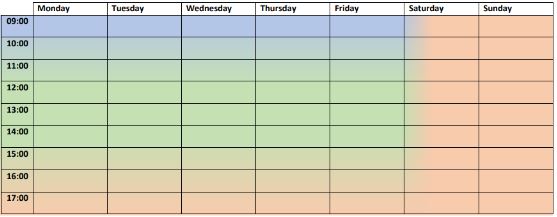
Welcome to the starting line...
A higher education course is an opportunity to develop specialist skills and knowledge, engage with cutting-edge concepts and explore a subject in depth. But, higher education is about much more than what you learn, it's also about how you learn. This page has been put together to help you understand how higher education is different, so that you can make the right kind of start.
-
Your First Year
Your First Year
Entering higher education for the first time brings new experiences and challenges. You will find that friends studying in other subjects or modules may have quite different timetables, and that their tutor have different expectations of them. Every student, no matter what their subject, or how they are expected to work, goes throguh a period of adapting and developing over their first year.
In the first year you will build the foundations of knowledge and academic practice that will support you through more advanced study in years two and three. The marks for your first year assessments, along with feedback from your tutors, are a guide to progress your understanding, give you an idea of areas you may need to develop further. The first year and the habits you develop really do "count"!
How is it different?
One big change from the way that you might have been taught previously is the way that you interact with and learn from acadmic staff. You'll find that staff have different specialisms and teach in different way that you might be used to from school or college. You will also need to undertake more independent learning, not just in the form of "homework" assessments, but also by engaging with reading and practical work outside of class, or bby practicing specific skills.
Will there be help?
Although you will take responsibility for your own progress, there are poeple that can help you. In addition to your lecturers, you can ask library staff for advice on study skills and materials, learning support staff can help with special arrangements for assessments and exams, there are workshops you can attend to learn more about the acadmic skills you need, and acadmic coaching for one-to-one acadmic development. This support isn't just for when you feel like you are struggling, it's for anybody that wants to make sure they get the best out of the themselves during their studies. You just have to ask.
New Terminology
Term Meaning Academic / Lecturer Academic staff are sometimes called lecturers because amongst other responsibilities they will deliver lectures to you on your programme. Not only do they teach, but they may also carry out research and have working experience in their subject area. Academic Coach An academic coach offers guidance, resources and exercises that can help you to identify goals and areas for academic improvement. Assessment An assessment is a piece of work that you are asked to complete as part of your degree programme and which will be marked. You will be set several assessments each semester; these could be essays, exams, presentations or other types of work. Feedback When you hand work in to be marked, academic staff will also make comments on what you have submitted. These comments are called ‘feedback’ and are there to help you to understand what you have done well and what you could improve. Feedback may not always be individual for example, you may be given whole group feedback, perhaps in a lecture. Module HE Courses are divided into modules. These are classes on specific topics that may run for part, or all of the academic year. Depending upon your course, you may be able to choose between different optional modules to complete your course. Reading List Some modules that you study will have a reading list with a number of texts on it that are relevant to the subject. Most of these texts will be available from the library, either as print or electronic copies. You may not have to read all of the texts suggested, but some may be compulsory. References / Referencing Because new ideas, discoveries and theories about subjects happen over time, different researchers write about these and share them with others. When anyone writes about the ideas of others, it is essential to acknowledge that they have come from someone else. To do this we use referencing, which you will learn more about during your first year.
-
Independent Learning
Independent Learning
Becoming a successful independent learner is essential if you want to achieve good marks in higher education; it is one of the most essential skills to develop on a higher educationcourse and is one of the reasons that they are highly regarded by many employers.
This means taking responsibility for your own workload; being motivated to learn, managing your time, and reflecting on your progress are all essential.
If you have received lots of support and direction in the past, you might find this increased responsibility difficult to manage at first.
In this section you will find insights into different aspects of independent learning as well as practical advice on making it work for you.
Planning
You will often study several modules in parallel. Sometimes, this will mean working on different assignments at the same time. Planning your work effectively in this situation will help you to optimise your time and minimise the pressure of working to multiple deadlines.
Timetable
Deep Focus
Working independently means that you have more control over how and when you get your work done. If you want to be really productive, plan in some deep focus sessions!
- Set aside some time to study.
- Decide where you will work. What resources and environment will you need?
- Set a realistic goal for your study session. What do you want to achieve?
- Write yourself a reminder of everything you will need for your study session.
- Break down the goal into small chunks, and decide how long to spend on each.
- Note down any problems or questions that arise as you go along. Think about how you will address these at the end of the session.
-
Getting down to work
Getting down to work
You will be regularly assessed to ensure that you are on track with your studies. For many disciplines this will take the form of written essays, project reports, or other types of assessment submitted at intervals during teaching. The marks that you receive will form a portion of your final module mark.
You may also be asked to submit unassessed essays or assignents. These are graded but do not count towards your module mark; they are used to prepare you for formal exams and to consolidate your knowledge.
To ensure that you fully understand topics and are able to perform well during assessments, it is important that you contribute to discussions in your classes. You should not be afraid to ask academic staff for help if you are unsure about anything.
Reading in HE
Whatever subject you are studying, reading will play a much bigger role in your learning than it has done before.
Why is reading so important?
- Peer-reviewed publications are the main way in which researchers communicate their work and discoveries.
- There won’t be one textbook or research paper for your subject. You might have recommended books or papers, but you’ll also need to read other texts to get a full understanding of a topic.
- It isn’t enough to rely on sources such as Wikipedia or news articles. You need to go deeper to find out what experts in your field have really discovered.
How will I know what to read?
You’ll choose a selection of modules to study each year, each module investigating a different topic. To help you develop a deep understanding, reading lists or reading materials are compiled by your lecturers for you. Sometimes you’ll be told what to read each week, or your list may have a wide choice of texts listed by topic. You will also be asked to supplement this with reading from your own choice of academic texts on the same topic.
How you find and analyse sources other of information is part of how your lecturers will assess you. Reading regularly is essential, and you’ll learn a lot from it, not just about your subject, but also about what kind of sources are useful.
Your First Assessment
Your first assessment may seem daunting! Follow these handy tips to help you to produce a successful essay and make the most of feedback from your tutor.
Read your assessment brief Read the brief carefully more than once. It will give you an overview of what to aim for. the format required, and the deadline. For help reading assessment briefs see this guide. What are you being asked to do? Many different types of assessment are used in HE. Alongside essays and exams which feature in almost all courses, you could also be asked to give a presentation, write a literature review, blog post or a case study. If you aren’t sure what is expected of you, ask for more guidance from lecturers or book time with the academic coach to discuss assessment methods and expectations. Produce a draft The sooner you start working on your assessment the easier it will be to explore, refine and improve your ideas; you shouldn’t wait until you know exactly what you want to write before you start drafting as this can lead to confirmation bias. Instead, you should read about a topic and begin to draft your opinions based upon the information you can find. Some assessments may allow you to submit a draft for feedback before completing the assessment, but you can always submit a sample of your work for informal feedback from the academic coach. Submit on time If you hand in work late, your maximum grade will automatically be capped no matter how good your work is. This could cost you as much as 60% of your grade. It’s always more sensible to submit on time, even if you’re work isn’t perfect. Use your feedback Keeping your feedback and reflecting on it before you begin work on your next assignment is a really good way to improve your work. You can use a template to help you quickly identify the areas in which you are losing the most marks.
-
Taking it further
Taking it further
Come along and join us at one of our Undergraduate Open day's. We will be hosting several Undergraduate Open days throughout the acadmic year, across our Campuses. For more information about our Open day's and how to register, please click the button below. We look forward to seeing you there!



